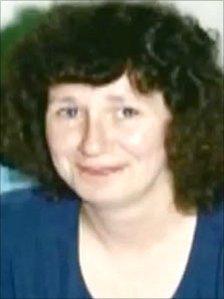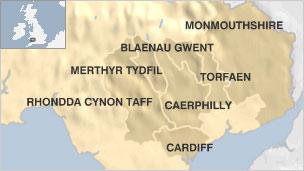New Legionnaires' rule call after south Wales outbreak
- Published

Bev Morgan's death is directly linked to the Heads of the Valleys outbreak
A solicitor representing people after a Legionnaires' disease outbreak is calling for tighter regulations.
A 49-year-old woman, Bev Morgan, from Rhymney, in Caerphilly county, has died in the outbreak in south Wales.
Two other people in south Wales have also died from the disease this month, but are not linked to the outbreak.
Philip Banks, of solicitors Irwin Mitchell, said there should be better regulation of cooling towers and other equipment blamed for the disease.
Some of the victims of the outbreak in south Wales say it should not take an outbreak to highlight failures.
Mr Banks called for improved regulation of cooling towers, which have been at the centre of investigations into the cause of the outbreak, which is centred along the Heads of the Valleys road.
"A system could be put in place, for example an MoT system where companies have to have a certification system in place [where] they are maintained, inspected, disinfected and cleaned," he said.
"That would be a step forward to stop this happening again.'
Victims have also spoken out about safety checks.
Joan Evans, 67, is recovering at home in Pontlottyn near Rhymney, Caerphilly county, having survived a disease that kills between 10 - 15% of its victims.
She said she had no idea how she got it and argued that it had taken an outbreak to reveal that someone somewhere probably had not been maintaining their equipment properly.

Map showing the areas, mostly in the valleys, where the investigation is concentrating
"It doesn't come out until something like this happens," she said.
"It should be checked on a regular basis. It's too late then, isn't it?"
Environmental health officers and the Health and Safety Executive are responsible for policing a system which relies on owners of premises to fulfil their responsibilities.
They must register cooling towers and ensure any equipment where the legionella bacteria can grow is properly maintained to prevent that.
But the search for the source has revealed that not all employers are doing this.
Meanwhile, Public Health Wales has defended its decision to delay alerting the public to the outbreak.
Doctors were told about the outbreak on 3 September but the authorities did not inform people until four days later.
Some GPs have raised concerns over the length of time taken.
However, Dr Gwen Lowe, a consultant in communicable disease control for Public Health Wales, told BBC Wales' Week In Week Out the delay was necessary so the health protection team could accurately assess the situation.
She said: "The reason why we delayed the public announcement of the outbreak was to allow our clinical colleagues and our GP colleagues to have that information to enable them to act, to make sure we had all the relevant information that we needed.
"You can imagine that once you declare an area you're interested in, people's recall of where they have been actually becomes a bit muddied by the information that is in the public domain.
Outbreak area
"It's very helpful to get the true and accurate information from the people who have been ill before they are aware we are investigating the cluster in a certain area."
Three people have now died but only the death of a 49-year-old woman is linked to the outbreak.
A 70-year-old man and a woman, 64, from Pontypridd, also died of the disease last week.
That makes a total of 19 people with Legionnaires' identified as being linked to the outbreak.
No new cases have been reported since 10 September.
The outbreak area is the corridor 12km (7.5 miles) either side of the Heads of the Valleys road between Abergavenny in Monmouthshire and Llandarcy in Neath Port Talbot.
Week In Week Out is on BBC One Wales at 1930 BST on Wednesday 15 September.
- Published15 September 2010
- Published14 September 2010
- Published14 September 2010
- Published13 September 2010